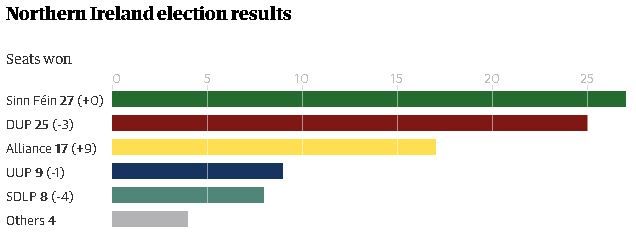
United Ireland: why is it not on cards despite Sinn Féin success?
Sinn Féin hailed its first victory in a Northern Ireland assembly election as a defining moment for the British-controlled region and called for a debate on a united Ireland.
The party’s president, Mary Lou McDonald, had a simple message for unionists on Saturday, telling them: “Don’t be scared, the future is bright for us all.”
The party has deliberately played down its long-term goal for a united Ireland, but unionists will have been spooked by previous statements that they would like to see a border poll on Irish unification within five to 10 years.
Can Sinn Féin call a border poll as the largest party in Northern Ireland?
Categorically no. That power lies only with the Northern Ireland secretary. Brandon Lewis on Sunday categorically ruled out such a poll and his successors are unlikely to order a referendum with such profound implications.
As Sinn Féin’s deputy leader, Michelle O’Neill, pointed out on the BBC’s leadership debate before the election, the Brexit vote demonstrated the perils of referendums called without adequate preparation.
The last such exercise in Ireland legalised abortion and is widely considered a model for controversial polls. It took years of preparation including citizens’ assemblies and proposed legislation agreed by parliament in advance so voters knew the precise consequence of their ballot.
How can a border poll come about?
The Good Friday agreement allows for a poll at some point but avoids defining the circumstances precisely other than it is the British government who decides not parties in Northern Ireland. It states: “If at any time it appears likely to him that a majority of those voting would express a wish that Northern Ireland should cease to be part of the United Kingdom and form part of a united Ireland, the Secretary of State shall make an Order in Council enabling a border poll”.

Is the election result enough to qualify as a majority for a poll?
The agreement does not define what it means by a majority, but experts say a number of metrics would have to be used, not just an election result.
A group of academics led by Alan Renwick, the deputy director of University College London’s constitution unit, spent two years studying a potential border poll. Their 259-page report asks all the key questions about how one could come about and how it would be designed.
They conclude that there would have to be majority support for a united Ireland, probably between 51% and 55%, for some time before the secretary of state would have to exercise their “mandatory duty”.
Alan Whysall, also of the UCL constitution unit, points out that a united Ireland was a distant prospect in 1998 and the wording in the agreement is marred by “serious gaps and ambiguities in the framework” for a poll.
UCL suggests six sources of evidence for a majority: election results, opinion polls, qualitative research, a vote in Stormont, seats won at elections and demographic data.
Why is demographic data important?
It is widely assumed, rightly or wrongly, that those of Catholic heritage would support a united Ireland while those of a Protestant persuasion would fight for the status quo.
The latest census results out this summer could show that Catholics outnumber Protestants for the first time.
Peter Shirlow, the director of the University of Liverpool’s institute of Irish studies, believes however that a new cohort could emerge as Northern Ireland’s peace settlement matures. He calls them “secular unionists” from both faith heritages who want to Northern Ireland to remain part of the United Kingdom.
If there was a united Ireland what would it look like?
Debates south of the border assume that parliament would sit in Dublin if a united Ireland were ever to come to pass, but UCL found this would be fraught with problems.
Its report outlines four constitutional options:
* Devolved institutions retained in Northern Ireland but with sovereignty transferred from London to Dublin.
* A single central legislature, likely to be in Dublin, but unionists would be likely to see this as a hostile takeover. “This model has been the historic preference of many Irish republicans, constitutional or otherwise. But some would see this approach [as came across in our evidence sessions] as being at odds with the consensus-building aspect of the 1998 agreement,” UCL says.
* A federal state. This model “would avoid some of the governance complications of lopsided devolution. But a two-unit federation would be imbalanced,” says UCL, which looked at institutions based around city regions or centres of population.
* A confederation of two states – a Northern Ireland independent of the UK and Ireland. UCL found this “would less clearly meet the prescription of unity laid down by the 1998 agreement”. The post-Brexit status of Northern Ireland in or out of the EU could also require a referendum.










